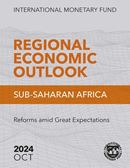This web page provides information in on the activities of the Office, views of the IMF staff, and the relations between Mali and the IMF. Additional information can be found on Mali and IMF country page, including official IMF reports and Executive Board documents in English and French that deal with Mali.
At a Glance
- Mali joined the Fund in September 27, 1963.
- Total Quota: SDR 186.60 Million
- Loans Outstanding: SDR 94.10 Million (May 2016)
- Press Release: IMF Executive Board Completes Fifth Review Under the Extended Credit Facility and Approves US$26.9 Million Disbursement for Mali
- Last Article IV/Country Report: May 31, 2018 (Report No. 18/141)
Office Activities
-
March 22, 2019
-
Tenth Review under ECF Arrangement (Presentation)
November 5, 2018
-
IMF African Department Director Visit to Mali
(French)
November 1, 2018
-
More Trade Within Africa Offers Route to Faster Growth
Increased intraregional trade and greater investment in infrastructure offer the countries of Africa direct routes to faster economic growth, African finance ministers said.
October 9, 2010
-
L’impact de la crise financière mondiale sur l’Afrique subsaharienne
Perspectives économiques régionales
May 19, 2010
IMF's Work on Mali
-
November 11, 2024
An International Monetary Fund (IMF) staff team led by Mr. Antonio David held meetings from October 28 to November 9, 2024, on the sixth review of the agreement with Niger under the Extended Credit Facility (ECF) and the second review of the arrangement under the Resilience and Sustainability Facility (RSF) and conducted discussions on the 2024 Article IV Consultation
-
November 7, 2024
A team from the International Monetary Fund (IMF) led by Niko Hobdari, Mission Chief for Guinea Bissau, held meetings in Bissau during October 29 - November 6, 2024 to discuss macroeconomic policies in the context of the Seventh Review of the ECF arrangement.
-
October 17, 2024
IMF has reached staff-level agreement with Benin on the Fifth Review of Benin’s EFF/ECF and the Second Review of the Resilience and Sustainability Facility (RSF).
-
Guinea-Bissau is Using Blockchain to Boost Fiscal Transparency
October 2, 2024
To better manage its public sector wage bill, Guinea-Bissau has embraced blockchain technology, a secure digital mechanism that enables tracking and reporting on wage expenditure for civil servants.
-
IMF Staff Concludes Visit to Senegal
September 12, 2024
Economic activity weakened in the first half of 2024 and prospects remain challenging for the remainder of the year. The fiscal position is expected to deteriorate amid lower revenue collections and increased expenditure on energy subsidies and interest payments.
Regional Economic Outlook for Sub-Saharan Africa
October 25, 2024
Sub-Saharan African countries are implementing difficult and much needed reforms to restore macroeconomic stability, and while overall imbalances have started to narrow, the picture is varied. Policymakers face three main hurdles. First, regional growth, at a projected 3.6 percent in 2024, is generally subdued and uneven, although it is expected to recover modestly next year to 4.2 percent. Second, financing conditions continue to be tight. Third, the complex interplay of poverty, scarce opportunities, and weak governance--compounded by a higher cost of living and short-term hardships linked to macroeconomic adjustment--are fueling social frustration. Within this environment, policymakers face a difficult balancing act in striving for macroeconomic stability while also working to address development needs and ensure that reforms are socially and politically acceptable. Protecting the most vulnerable from the costs of adjustment and realizing reforms that create sufficient jobs will be critical to mobilize public support.
Read the Report
Fraudulent Scam Emails Using the Name of the IMF
We would like to bring to the notice of the general public that several variants of financial scam letters purporting to be sanctioned by the International Monetary Fund (IMF) or authored by high ranking IMF officials are currently in circulation, and may appear on official letterhead containing the IMF logo. The scam letters instruct potential victims to contact the IMF for issuance of a “Certificate of International Capital Transfer” or other forms of approval, to enable them receives large sums of monies as beneficiaries. The contact e-mail information is always BOGUS and unsuspecting individuals are then requested to send their personal banking details which the scammers utilize for their fraudulent activities.For more information please see Fraudulent Scam Emails Using the Name of the IMF
Departmental Papers on Africa





